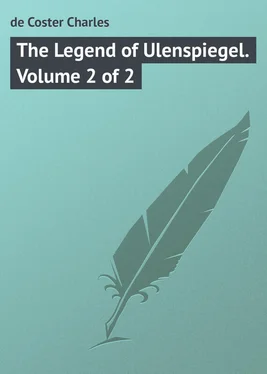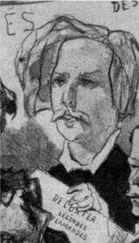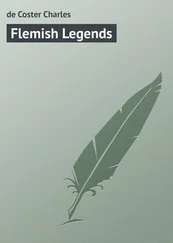Charles de Coster - The Legend of Ulenspiegel. Volume 2 of 2
Здесь есть возможность читать онлайн «Charles de Coster - The Legend of Ulenspiegel. Volume 2 of 2» — ознакомительный отрывок электронной книги совершенно бесплатно, а после прочтения отрывка купить полную версию. В некоторых случаях можно слушать аудио, скачать через торрент в формате fb2 и присутствует краткое содержание. Жанр: Прочие приключения, foreign_prose, на английском языке. Описание произведения, (предисловие) а так же отзывы посетителей доступны на портале библиотеки ЛибКат.
- Название:The Legend of Ulenspiegel. Volume 2 of 2
- Автор:
- Жанр:
- Год:неизвестен
- ISBN:нет данных
- Рейтинг книги:5 / 5. Голосов: 1
-
Избранное:Добавить в избранное
- Отзывы:
-
Ваша оценка:
- 100
- 1
- 2
- 3
- 4
- 5
The Legend of Ulenspiegel. Volume 2 of 2: краткое содержание, описание и аннотация
Предлагаем к чтению аннотацию, описание, краткое содержание или предисловие (зависит от того, что написал сам автор книги «The Legend of Ulenspiegel. Volume 2 of 2»). Если вы не нашли необходимую информацию о книге — напишите в комментариях, мы постараемся отыскать её.
The Legend of Ulenspiegel. Volume 2 of 2 — читать онлайн ознакомительный отрывок
Ниже представлен текст книги, разбитый по страницам. Система сохранения места последней прочитанной страницы, позволяет с удобством читать онлайн бесплатно книгу «The Legend of Ulenspiegel. Volume 2 of 2», без необходимости каждый раз заново искать на чём Вы остановились. Поставьте закладку, и сможете в любой момент перейти на страницу, на которой закончили чтение.
Интервал:
Закладка:
Lamme, rubbing his hands, exclaimed:
“You are not to have them all, rogue.”
And he was delighted.
Ulenspiegel, applying patience to his trouble, came back to the farm with the wedding party. And there he drank, sang, and was jolly, drinking hob-nob with the jealous girl. Thereat Hans was merry, but not Tannekin, nor the girl’s betrothed.
At noon, in bright sunshine and a cool wind, the wagons set forth, all greenery and flowers, all the banners displayed to the merry sound of tambourines, shawms, fifes, and bagpipes.
At Alba’s camp there was another feast. The advanced outposts and sentinels having sounded the alarm, came in one after another, saying:
“The enemy is near at hand; we have heard the noise of tambourines and fifes and seen his ensigns. It is a strong body of cavalry come there to draw you into some ambush. The main army is doubtless farther on.”
The duke at once had his camp masters, colonels, and captains informed, ordered them to set the army in battle array, and sent to reconnoitre the enemy.
Suddenly there appeared four wagons advancing towards the musketeers. In the wagons men and women were dancing, bottles were jigging round, and merrily squealed the fifes, moaned the shawms, beat the drums and droned the bagpipes.
The wedding party having halted, Alba came in person to the noise, and beheld the new-made bride on one of the four wagons; Ulenspiegel, her bridegroom, all rosy and fine beside her, and all the country folk, both men and women, alighted on the ground, dancing all about and offering drink to the soldiers.
Alba and his train marvelled greatly at the simplicity of these peasants who were singing and feasting when everything was in arms all about them.
And those who were in the wagons gave all their wine to the soldiers.
And they were well applauded and welcomed by them.
The wine giving out in the wagons, the peasants went on their way again to the sound of the tambourines, fifes, and bagpipes, without being interfered with.
And the soldiers, gay and jolly, fired a salvo of musket shots in their honour.
And thus they came into Maestricht, where Ulenspiegel made arrangements with the reformers’ agents to despatch by vessels arms and munitions to the fleet of the Silent.
And they did the same at Landen.
And they went in this way elsewhere, clad as workmen.
The duke heard of the trick; and there was a song made upon it, which was sent him, and the refrain of which was:
Bloody Duke, silly head,
Have you seen the newlywed?
And every time he had made a wrong manœuvre the soldiers would sing:
The Duke has dust in eye:
He has seen the newlywed.
XXIV
In the meantime, King Philip was plunged in bitter melancholy. In his grievous pride he prayed to God to give him power to conquer England, to subdue France, to take Milan, Genoa, Venice, and great lord of all the seas, thus to reign over all Europe.
Thinking of this triumph, he laughed not.
He was continually and always cold; wine never warmed him, nor the fire of scented wood that was always burning in the chamber where he was. There always writing, sitting amid so many letters that a hundred casks might have been filled with them, he brooded over the universal domination of the whole world, such as was wielded by the emperors of Rome; on his jealous hatred of his son Don Carlos, since the latter had wanted to go to the Low Countries in the Duke of Alba’s place, to seek to reign there, he thought, without doubt. And seeing him ugly, deformed, a savage and cruel madman, he hated him the more. But he never spoke of it.
Those who served King Philip and his son Don Carlos knew not which of the twain they ought to fear the most; whether the son, agile, murderous, tearing his servitors with his nails, or the cowardly and crafty father, using others to strike, and like a hyæna, living upon corpses.
The servitors were terrified to see them prowling around each other. And they said that there would soon be a death in the Escurial.
Now they learned presently that Don Carlos had been imprisoned for the crime of high treason. And they knew that he was devouring his soul with black spite, that he had hurt his face trying to get through the bars of his prison in order to escape, and that Madame Isabelle of France, his mother, was weeping without ceasing.
But King Philip was not weeping.
The rumour came to them that Don Carlos had been given green figs and that he was dead the next day as if he had gone to sleep. The physicians said as soon as he had eaten the figs the blood ceased to beat, the functions of life, as Nature meant them, were interrupted; he could neither spit, nor vomit, nor get rid of anything from out of his body. His belly swelled at his death.
King Philip heard the death mass for Don Carlos, had him buried in the chapel of his royal residence and marble set over his body; but he did not weep.
And the lords in waiting said to one another, mocking the princely epitaph that was on the tombstone:
And King Philip looked with a lustful eye upon the Princess of Eboli, who was married. He besought her love, and she yielded.
Madame Isabelle of France, of whom it was said that she had favoured the designs of Don Carlos upon the Low Countries, became haggard and woebegone. And her hair fell out in great handfuls at a time. Often she vomited, and the nails of her feet and her hands came out. And she died.
And King Philip did not weep.
The hair of the Prince of Eboli fell out also. He became sad and always complaining. Then the nails of his feet and his hands came out, too.
And King Philip had him buried.
And he paid for the widow’s mourning and did not weep.
XXV
At this time certain women and girls of Damme came to ask Nele if she would be the May bride and hide among the brushwood with the groom that would be found for her; “for,” said the women, not without jealousy, “there is not one young man in all Damme and round about who would not fain be betrothed to you, who stay so lovely, good, and fresh: the gift of a witch, doubtless.”
“Goodwives,” answered Nele, “say to the young men that seek after me: ‘Nele’s heart is not here, but with him that wandereth to deliver the land of our fathers.’ And if I am fresh, even as you say, it is no gift of a witch, but the gift of good health.”
The goodwives replied:
“All the same, Katheline is suspect.”
“Do not believe what ill folk say,” answered Nele; “Katheline is no witch. The law-men burned tow upon her head and God struck her with witlessness.”
And Katheline, nodding her head in a corner where she was sitting all huddled up, said:
“Take away the fire; he will come back, my darling Hanske.”
The goodwives asking who was this Hanske, Nele replied:
“It is the son of Claes, my foster brother, whom she thinks she lost since God struck her.”
And the kindly goodwives gave silver patards to Katheline. And when they were new she showed them to someone that nobody could see, saying:
“I am rich, rich in shining silver. Come, Hanske, my darling; I will pay for my love.”
And the goodwives being gone, Nele wept in the lonely cottage. And she thought on Ulenspiegel wandering in far-off countries where she might not follow him, and on Katheline who, often groaning “take away the fire,” held her bosom with both hands, showing in this way that the fire of madness burned her head and her body feverishly.
And in the meanwhile the bride and groom of May hid in the grass.
Читать дальшеИнтервал:
Закладка:
Похожие книги на «The Legend of Ulenspiegel. Volume 2 of 2»
Представляем Вашему вниманию похожие книги на «The Legend of Ulenspiegel. Volume 2 of 2» списком для выбора. Мы отобрали схожую по названию и смыслу литературу в надежде предоставить читателям больше вариантов отыскать новые, интересные, ещё непрочитанные произведения.
Обсуждение, отзывы о книге «The Legend of Ulenspiegel. Volume 2 of 2» и просто собственные мнения читателей. Оставьте ваши комментарии, напишите, что Вы думаете о произведении, его смысле или главных героях. Укажите что конкретно понравилось, а что нет, и почему Вы так считаете.












